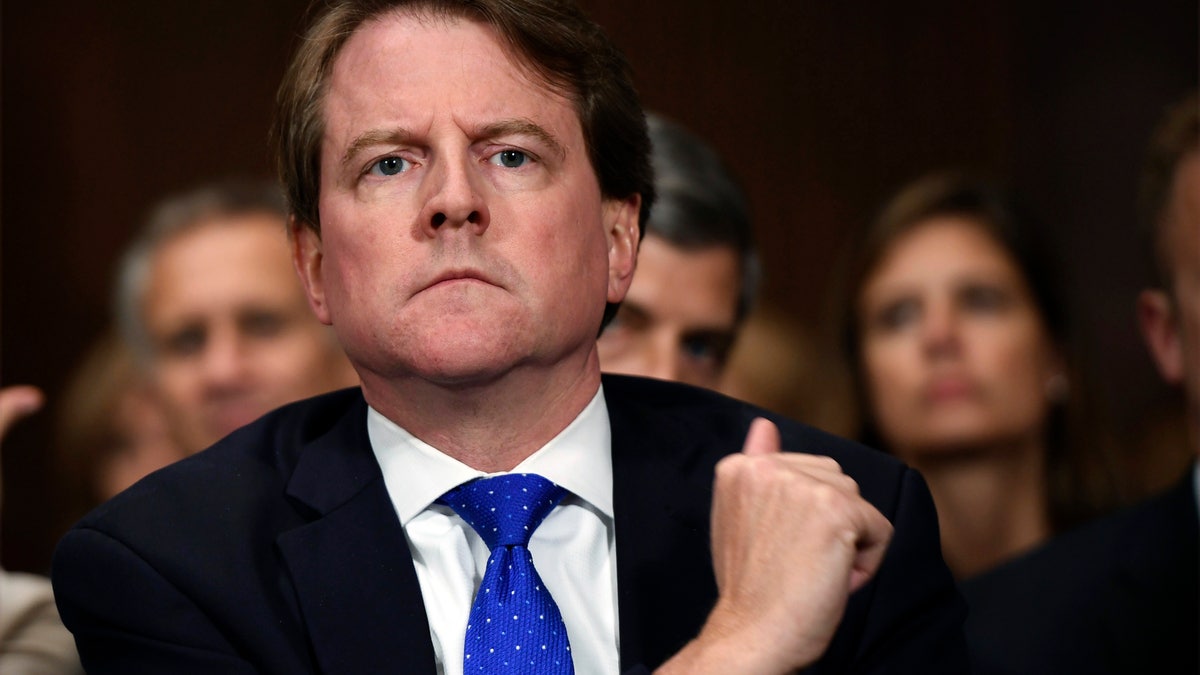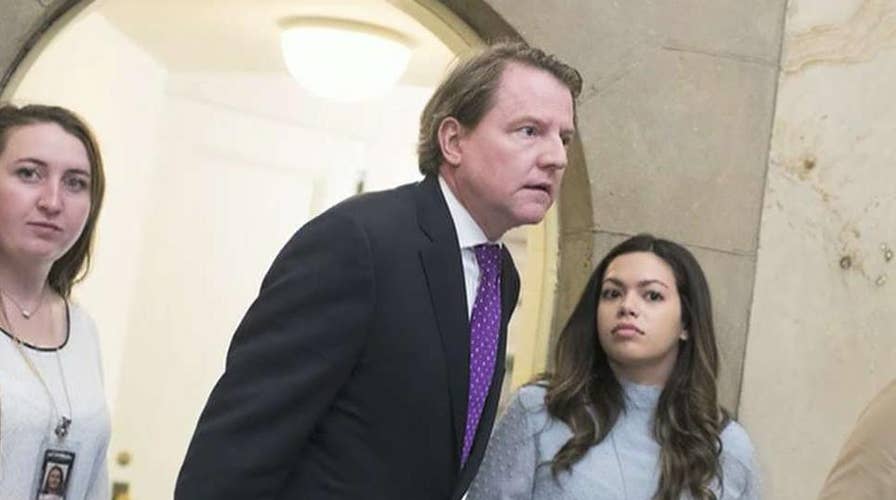Fox News Flash top headlines for September 1
Fox News Flash top headlines are here. Check out what's clicking on FoxNews.com.
A group of House Democrats called for the chamber to resurrect its rarely used "inherent contempt" power on Monday after a federal appeals court dismissed a lawsuit by the House Judiciary Committee to enforce a subpoena against former White House Counsel Don McGahn.
The committee was seeking testimony from McGahn on President Trump, and the full D.C. Circuit Court of Appeals had previously ruled that the House could sue to enforce the subpoena, but that McGahn should have the opportunity to argue that it was too broad. A three-judge panel on Monday agreed, upsetting Democrats, including House Speaker Nancy Pelosi, D-Calif., who said it was "a challenge to our system of checks & balances, and is at odds with Supreme Court precedent."
Pelosi said the House would again seek a hearing with the full appeals court, but several other House Democrats called on the chamber to bring back its "inherent contempt" power that allows the House to unilaterally enforce its subpoenas, which it previously did by dispatching the House Sergeant at Arms to arrest figures until they provided their testimony to Congress. These Democrats, led by Rep. Ted Lieu, D-Calif., propose that the House instead levy fines against uncooperative witnesses.
"[T]his protracted legal battle over subpoena enforcement tells us that the House needs to create procedures to enforce subpoenas itself,' Lieu said in a statement. "The Supreme Court already has said that Congress has that power through inherent contempt. It's well past time to use it. The House needs to pass our inherent contempt resolution, which enables the House to levy penalties directly against those refusing to comply with congressional subpoenas."
Lieu added: "This can be done without needing the approval of either the Senate or the Executive Branch."
He was joined Monday by Reps. Val Demings, D-Fla., David Cicilline, D-R.I., Jamie Raskin, D-Md., and Joe Neguse, D-Colo.
Inherent contempt used to be a relatively common power for Congress to exercise but has not been used in 90 years. Its standard practice was for the House or Senate to send their respective Sergeants at Arms to "arrest" someone who is refusing to provide testimony and hold them until they did so. The last time it was used was against Assistant Secretary of Commerce William MacCracken, who was held at the Willard Hotel in Washington, D.C., for 10 days.

In this Sept. 27, 2018, file photo, White House counsel Don McGahn listens as Supreme court nominee Brett Kavanaugh testifies before the Senate Judiciary Committee on Capitol Hill in Washington. A federal appeals court Monday threw out a lawsuit to compel McGahn to testify before the House Judiciary Committee. (Saul Loeb/Pool Photo via AP, File)
Lieu led the introduction of a resolution to change the rules of the House in late June which would provide procedures for the House to negotiate with witnesses who are not cooperating with subpoenas. But if no deal can be made the chamber would be able to levy a fine of $25,000 against the person being held in inherent contempt. That total could be increased in $25,000 increments if the person doesn't cooperate with the subpoena within 20 days, with a maximum penalty of $100,000.
Congress has relied on two other forms of contempt in recent years, most commonly civil contempt, where the body relies on courts to enforce subpoenas. It has also used criminal contempt, which asks the Department of Justice (DOJ) to prosecute the case. But with a Trump administration that has cooperated very little with Congress in charge of the DOJ and fighting tooth-and-nail in the courts, these House Democrats are seeking to use their inherent contempt power as a third, more direct option.
"Congress must do more to enforce our lawfully issued subpoenas," Cicilline said. "The inherent contempt power was used for decades to ensure no individual could hold themselves above the law. Given this President’s clear disdain for Congress’ ability to conduct oversight on behalf of the American people, it is time to reinvigorate this power to hold him and any future administrations accountable."
CLICK HERE TO GET THE FOX NEWS APP
Monetary fines have not been used in inherent contempt cases before, according to the Congressional Research Service (CRS), but have been suggested as a way to prevent an "unseemly" standoff between Congress and the Executive Branch if the legislature were to effectively imprison a previous or even current executive official.
But the CRS noted that because Congress has not imposed a fine in an inherent contempt case before, it is an "open question" whether that approach is legal and it may be challenged in the courts.
The appeals court Monday said that the House had no cause of action to enforce its subpoena against McGahn. The Trump administration has also asserted it has broad "absolute testimonial immunity" to block current and former administration officials like McGahn from speaking with Congress, but the appeals court panel did not address that argument Monday as it ruled solely on the lack of cause for action.
Fox News' Chad Pergram, Bill Mears and Evie Fordham contributed to this report.













































